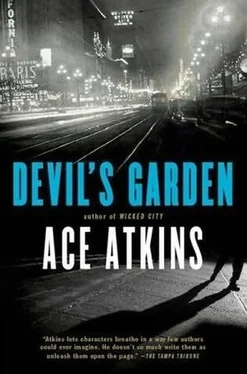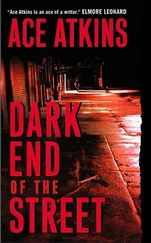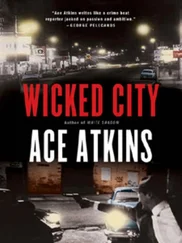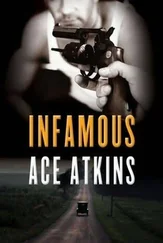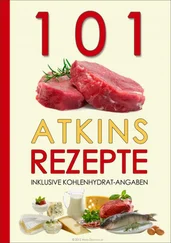“Mrs. Delmont, have you spent much time in Madera County?” Detective Reagan asked behind her.
Maude Delmont kept her eyes forward, letting the elevator slow to a stop and the gated door open. Without a word, she walked ahead of them.
“SO ARBUCKLE is A FREE MAN?” Mr. Hearst asked.
“Yes, sir,” said the young reporter.
“You saw him walk out of jail?”
“Yes, sir. Bail was five thousand.”
“Did he smile?”
“He grinned.”
“That’s a smile.”
The big black locomotive steamed south from San Francisco to Los Angeles, the young reporter still looking uneasy from when Hearst asked him on the journey, still worried about making the morning edition. The young man sat across from Hearst, afraid to touch the plate of food that George had carried from the kitchen, the roast beef and potatoes growing cold on the gilded china.
“Do you think he deserved to be tried with more than manslaughter?”
“I don’t know, sir.”
Hearst sliced into the roast beef, adding a touch of mashed potatoes on the fork. The gravy was creamy and bloody, fresh green beans on the side. He asked George to pour more wine and looked out at the flat, barren northern California countryside as they sped along, the occasional whistle blowing from the engineer.
“When should we expect a trial?”
“In a month or so.”
“What else do we have for the afternoon?”
“The disarmament conference begins in a few weeks. The Tong War continues in Chinatown. Mollie Merrick has a piece on the high rate of college coeds never marrying.”
“I mean on Arbuckle.”
“They bury the girl tomorrow in Hollywood. I’ve brought you the story of her viewing from the wire.”
Hearst set it by his elbow and scanned the story, George refilling his wineglass. The young reporter nervously checked his wristwatch, wanting more than anything to be away from the man the newsboys called The Chief and off his goddamn train.
8,000 AT L.A. VIEW BODY OF VIRGINIA RAPPE. Eight thousand persons-gray-headed matrons with their daughters, men in overalls who stood hat in hand, and schoolgirls with braided hair down their backs-all inspired by love, friendship, or morbid curiosity, viewed the body of Virginia Rappe, beautiful motion picture actress, as it lay in state between the hours of 10 a.m. and 4 p.m. at the undertaking establishment of Strother and Drayton in Hollywood today.
Draped in a white satin shroud, with flowers in her hands, the body of the girl, central figure of the tragedy which startled the country last week, looked extremely lifelike and natural. The casket was banked high with flowers, including the 1,000 tiger lilies ordered by Miss Rappe’s fiancé, Henry Lehrman, from New York, and across it was a white satin ribbon and in gold letters this: To my grave sweetheart.-From Henry.
Hearst closed the folder over the story and looked across the table at the young reporter fidgeting.
“Aren’t you going to eat?”
“Sorry. I’m a little nervous.”
“Of what?”
“I’m sorry, sir.”
“At least drink your wine,” Hearst said, downing the rest of his. “I never trust a newspaperman who doesn’t drink. Shows me he doesn’t have ink in his blood.”
He smiled, watching the reporter down the glass.
“I want Arbuckle smiling up high. I want you to show his cockiness and aloofness from the judge’s decision. What was the first thing he did when released?”
“Got a shave, sir.”
“A shave. From whom?”
“A neighborhood barber offered him one for free.”
“Set it up with the smile, walking out a free man for now, and then the smugness of getting a shave and a big meal at the Palace Hotel. He did have a big meal, I assume.”
“I can find out.”
“He’s not concerned about the girl at all. She’s dead, lying cold in a mortuary with her adoring fans swarming over her, and Arbuckle just wants to stuff himself to satisfy his mammoth appetites.”
The engineer blew the locomotive’s whistle again, and soon hovels slapped together from scrap wood and tin showed in the long coach windows. A fat Mexican woman cooked meat on an open stove, dirty children playing by her feet, a skinny baby on her bosom. Coolies hefted boxes from the backs of wagons and trucks to the train platform, and soon the locomotive slowed and drew to a long, steady stop.
The only sound in the cabin came from the hissing of the engine as the train took on more water and wood.
“You can go,” Hearst said. “Take the story on the girl.”
“Here?”
“Another train will come through,” Hearst said. “If not, just write your story and have it cabled to the office.”
The reporter stood and grabbed his coat and hat and nervously shook The Chief’s hand and walked back through the coach, George already holding the door open and then shutting it with a tight pop.
“Odd little fellow,” George said.
“They all are.”
“Are you okay, Mr. Hearst?”
“I’m fine. I’m fine.”
Hearst stood and watched as George cleared the china plates from the table. The coolies and Mexes looked up from their work at the strange black train pulling only two coaches. Hearst waved at them, and made his way back to the bath, shutting the door and locking it behind him, splashing water on his face and trying to steady himself from the nausea.
There had been a picture attached to the wire story on the girl’s burial. He had decided it was too much, the Rappe girl, with her insides cleaned out and sewn back whole, photographed in her Sunday best and covered with that goddamn white veil, a sweet smile upon her dead lips. Hearst ran cold water and wiped his giant eyes with a moist towel.
But his legs gave out and soon the big man was on his knees, hands wrapped around the brass commode and vomiting out the roast beef and potatoes, George knocking on the door.
Hearst yelled back that he was fine and to fetch some ice water.
Hearst, still on his knees, steadied himself. The image of the girl would not shake free of his mind. When he saw the girl’s face, it wasn’t the Rappe girl but Marion, pennies covering her eyes.
He felt feverish as he stood and tried to calm himself.
THE CAPTAIN OF DETECTIVES, Duncan Matheson, was an odd-looking duck, thought Maude Delmont. Odd because he looked so much like a policemen that she figured him to be a stock player in Hollywood. He wore one of those thick, waxed mustaches and smoked a pipe while he interviewed her in his little partitioned office made of pebbled glass and oak. His eyes were as black as coal, and he would ask questions as if they were statements and Maude didn’t know whether to answer, nod her head, or call him a liar.
“You’ve been married for a year or so.”
She decided to nod.
“To a Mr. Woods of Madera.”
She nodded again.
“Are you aware that Mr. Woods has been searching for you for months now and only knew you were in the city when he picked up a newspaper?”
She shook her head. It called for a shake.
“Are you in the process of divorce?”
“No, sir.”
“Mr. Woods has complained you left him without explanation.”
Maude’s throat felt dry and cracked. She had started to sweat. She never sweated. She almost closed her eyes, waiting for Captain Matheson to ask her all about the bonds and cash she stole from Cassius Clay Woods’s safe.
She held her breath and dropped her head into her waiting fingertips.
“I can explain,” she said. “Please. This has all been so traumatic.”
Captain Matheson stood. He was a great deal shorter than he looked sitting behind the desk and appeared downright minuscule as he passed Detectives Kennedy and Reagan, who stood against a brick wall lined with photos and fancy inked documents.
Читать дальше
